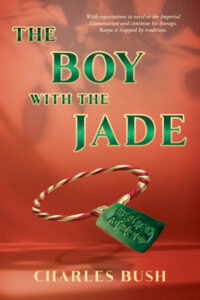The Sharjah International Book Fair (SIBF) is a literary festival and cultural event for the general public, but it is preceded each year by the Sharjah Publishers Conference, a rights marketplace and networking opportunity for publishers from around the globe.
Yoko Tawada’s Archipelago of the Sun, translated by Margaret Mitsutani, is the third and final instalment of a trilogy. The first two volumes—Scattered All Over the Earth and Suggested in the Stars—introduce a diverse cast of characters centered around Hiruko, a Japanese woman in search of her homeland, which seems to have vanished from the earth and almost from memory. Along the way she befriends a Danish linguist, a transgender Indian, a German museum worker, an Eskimo sushi chef, and a seemingly ageless Japanese cook. This motley group accompanies Hiruko in her search, which takes place across a near-future European landscape in which contemporary ecological and political issues have intensified. Europe is a tranquil welfare state while America has become the world’s largest manufacturing base. The climate has been horrendously damaged, causing the collapse of many ecosystems and the cultures they support. Immigration has become a necessity for many, even while some borders have calcified, and geopolitical tensions abound. And, of course, there is the looming question of what happened to Japan. (Did it sink beneath the sea? Enter political isolation? Or was it simply forgotten?)
The Norwegian explorer Thor Heyerdahl, never one to shrink from a challenge, visited Gobustan in Azerbaijan for two decades to prove his theory that the ancestors of today’s Scandinavians left behind the mysterious rock carvings near Baku. Uncanny similarities between petroglyphs showing the long, oared boats of Caspian seafarers and those of the Vikings, and between other rock carvings in both Azerbaijan and Norway tantalized Heyerdahl.
Dahlia Abraham-Klein’s grandfather Haim Abraham lived to 102. She was fortunate to have gotten to know him when she was younger, but it wasn’t until Haim passed away in 1999 that Abraham-Klein learned more about his life thanks to a journal he had left behind. This journal chronicled not just Haim’s life but that of the former Jewish merchant class in Central Asia. Haim wrote his journal entries in Judeo-Farsi, written in a unique cursive Hebrew script from Jews of Iran, Afghanistan and Central Asia. Judeo-Farsi is almost extinct now, so it took Abraham-Klein a decade to find someone who could translate and decipher the journal entries into Hebrew. She has taken many of these journal entries and has woven in her own narration in her new book, The Stateless Central Asian Merchant: The Life of Haim Aghajan Abraham Based on His Journal 1897-1986, a unique look into a Jewish community that no longer exists.
Chetan Bhagat occupies a distinct and highly influential space in contemporary Indian letters in English. While his previous work 11 Rules for Life nudged Bhagat into self-help, 12 Years reverts to his signature formula—romantic disillusionment as middle-class catharsis. His phenomenal commercial success from his 2005 debut novel Five Point Someone to this latest, eleventh work of fiction rests on a well-honed formula that fuses relatable urban narratives, lucid prose, and themes reflecting contemporary Indian life: aspirations, romance, career anxieties, and societal pressures.
War, and the threat of war, spurs governments to invest in secret military technologies and weapons. Imperial Japan, ahead of the Second World War, was no exception. After the First World War, Japan set up the Noborito Research Institute: a division of scientists and technicians to invest in overt and clandestine warfare.
A Swiss-Italian-Spanish author fluent in six languages (including English), Vanessa Fabiano first traveled to China more than thirty years ago and resided in Shanghai and Beijing around the time of SARS in the early 2000s. Her new collection of related stories, Chinese on the Beach, makes use of this timeframe, a period of growing friendships between Chinese and foreigners.

In 18th-century China, young aristocrat Baoyu—born with a jade pendant foretelling his fate—grapples with love, loss, and identity amid the grandeur and constraints of his powerful family. Torn between his cousin Daiyu and his devoted maid Amber, Baoyu’s privileged world unravels through tragedy, betrayal, and the crushing weight of expectation. Seeking freedom from duty and despair, he embarks on a spiritual quest shaped by Taoist and Buddhist wisdom.
In Silk Roads, food writer Anna Ansari connects areas and cuisines not typically associated in English-language cookbooks, traveling from Beijing, to Baku in Azerbaijan. The closest author/chronicler would perhaps be Paula Wolfert, who is known for her Mediterranean cookbooks spanning France, Morocco, and the “eastern Mediterranean” to include Turkey. Ansari’s food memories originate from her ethnically Turkish family who left Iran and settled in the US.
Arundhati Roy’s much-awaited memoir, Mother Mary Comes To Me, tackles Roy’s writing career, India’s sweeping political instability, and most of all, a reckoning with an exhilarating character: her mother, Mary Roy. From Roy’s village, fictionalised even here as “Ayemenem”, to the chaotic urban sprawl of Delhi, the book covers Roy’s rocky childhood, her brief architectural foray, her sudden and dizzying literary stardom, and eventually, her settling into the role as one of India’s most beloved—and most widely politicised—writers.

You must be logged in to post a comment.